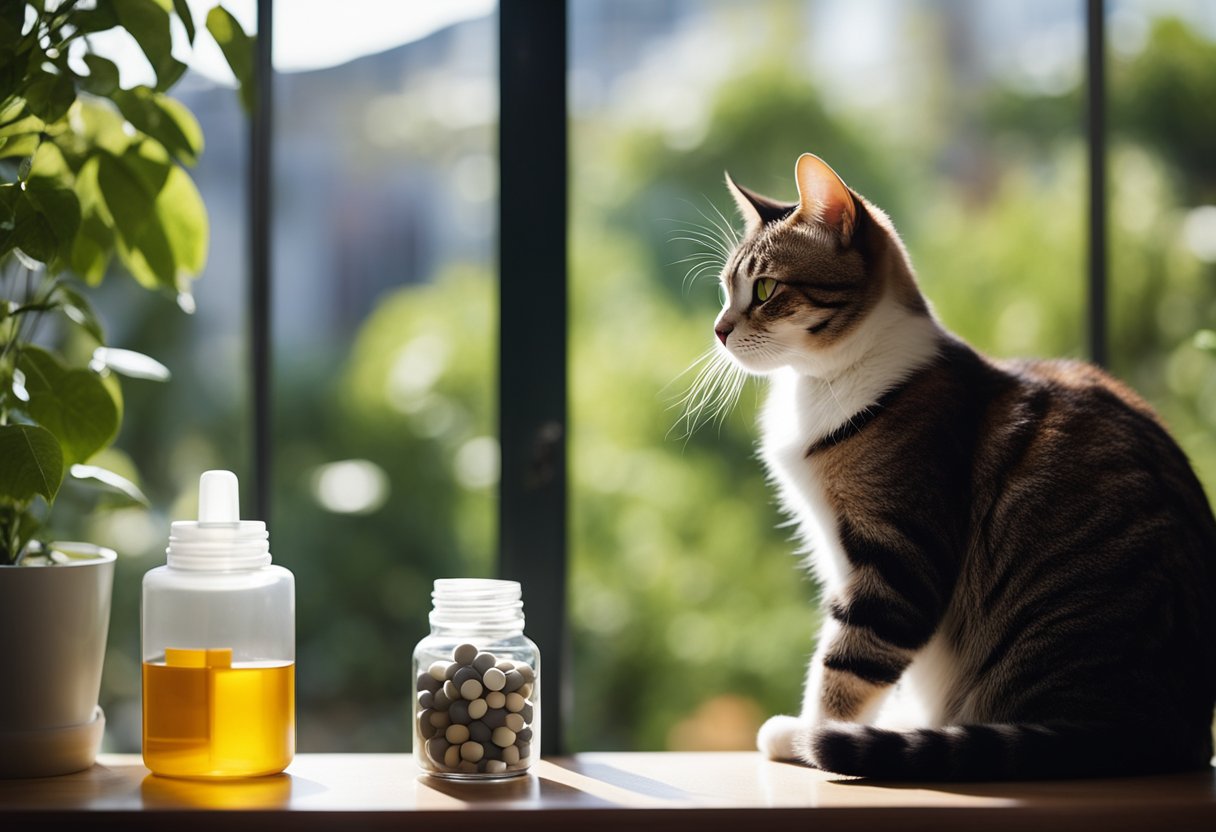As pet owners, we all want to ensure our furry friends stay healthy and live long, joyful lives. Administering the right pet medication is a critical component of their overall care. From routine preventative treatments to managing chronic conditions, the proper use of medications can greatly enhance our pets’ quality of life. It’s our responsibility to understand the various treatments available and how to safely manage our pets’ prescriptions.

Navigating the world of pet medication can seem daunting, but it’s essential for their well-being. It involves more than just giving them their daily dose; it’s about knowing the right type of medication whether it’s a flea and tick preventive or a heartworm pill. Keeping up-to-date with vet appointments, knowing when to refill prescriptions, and storing medicines safely are all part of the process. By taking these measures, we can prevent illnesses, alleviate pain, and possibly even save their lives in emergency situations.
Key Takeaways
- Proper pet medication management is crucial for maintaining our pets’ health.
- Understanding different treatment options ensures pets receive the right care.
- Safe storage and administration of medications protect our pets from potential harm.
Understanding Pet Medication
Have you ever been bewildered by the range of medications available for your furry friends? We’re here to navigate the vast world of veterinary pharmaceuticals together. It’s crucial to understand the specific types of pet medication that can be administered using smart devices and how these advancements simplify the process for us, ensuring our pets get their treatments on time and in the right doses.
Types of Pet Medication
When it comes to keeping our pets healthy, medication plays a pivotal role. Prescription drugs handle specific conditions like infections or chronic diseases, and we often find them in forms like tablets or liquids. Over-the-counter (OTC) medications provide relief for milder issues without needing a vet’s prescription—think flea prevention or mild pain relief. As pet owners, embracing smart dispensers could be our best move, allowing precise doses to be delivered without the usual stress.
- Prescription Medications: For serious health issues.
- Examples: Antibiotics, pain relievers, antiepileptics.
- OTC Medications: For less severe conditions.
- Examples: Dewormers, flea and tick preventatives, mild pain relievers.
Administering Medication to Pets
Giving medication can be a test of patience, can’t it? This is where smart technology comes in. Advanced pet medication dispensers are our allies, guiding us to give the correct dose at the correct time. Some can even be controlled through our smartphones, making the whole process a breeze. Remember to check whether the medication is in the right form for the dispenser and to follow specific instructions for pet medications to ensure effectiveness and your pet’s safety.
- Smart Dispensers: For ease and accuracy.
- Advantages: Timely dosing, minimal waste.
- Manual Administration: Traditional methods.
- Tips: Conceal pills in food, use syringes for liquids.
Pet Prescription Management

Managing your pet’s prescriptions is crucial, and we know you want only the best care for them. That’s why we’re discussing the most efficient ways for you to obtain and manage your pet’s medications. Let’s make sure our beloved companions are never without their necessary treatments.
Online Pet Pharmacies
Online pet pharmacies make it easy for us to order our pet’s prescription medications conveniently. They often offer a wide variety of prescription medications, including specialty compounds, and deliver them right to our doorstep. It’s important to use reputable sources that guarantee the authenticity of their medications, ensuring our furry friends get the precisely formulated medications they need.
- Authenticity: Only order from trusted sources.
- Convenience: Get medications delivered at home.
- Variety: Access to a comprehensive formulary.
Vet Prescription Policies
Veterinarians have policies in place to ensure the safe dispensing of prescription medications. When we visit our vet, we can discuss the best treatment options for our pets and receive prescriptions that can be filled either at their in-house pharmacy or at an approved online pharmacy. Our vet’s guidance is crucial, as they set dosage amounts, provide detailed administration instructions, and ensure our pets are getting the right medication.
- Safety: Veterinarians ensure the safe dispensing of medications.
- Guidance: Detailed usage and dosage instructions are provided.
- Flexibility: Prescriptions can be filled in-house or online.
Safety and Storage

When it comes to keeping our pets healthy and safe, the correct handling of their medications is crucial. We want to grab your attention with important guidelines on proper dosage and potential side effects, as well as storage and disposal practices that every pet owner should know. It’s in our shared interest to ensure medications contribute to our pets’ wellbeing rather than pose a risk. Therefore, we encourage you to follow these straightforward but vital steps to make certain your furry friends benefit from their treatments.
Proper Dosage and Potential Side Effects
Dosage Precision:
- Never exceed prescribed dosages. Exact amounts are crucial. Use a digital pet medication dispenser for accuracy.
- Keep a dosing schedule. Smart pet apps can track medication times and remind us so no dose is missed or doubled.
Awareness of Side Effects:
- Monitor for any unusual behavior or reactions after administering medication.
- Quickly consult a vet if you suspect side effects. Use a smart vet chat service for timely advice.
Storage and Disposal of Pet Medications
Secure Storage Tactics:
- Lock medications in a safe place out of paws reach. Consider a smart-lock medication box.
- Differentiate medications clearly to avoid mix-ups. Use a label maker or smart inventory system.
Responsible Disposal:
- Dispose of expired or unused medications safely. Utilize smart medication disposal systems that seal or disable drugs.
- Contact a professional if unsure about disposal methods. Seek guidance from smart-device enabled waste management services.
Common Treatments
When we think about keeping our pets healthy, it’s crucial to consider routine treatments that can prevent common illnesses. We prioritize protective care such as flea and tick prevention, safeguarding against heartworm, and managing allergies, because we know these treatments are integral to maintaining our furry friends’ wellbeing.
Flea and Tick Prevention
Preventing fleas and ticks is not just about keeping our pets itch-free—it’s about avoiding a range of diseases that these parasites can carry. Flea and tick prevention methods can include collars, topical liquids, and oral medications, each designed to provide protection for different durations and through various methods of application. It’s reassuring to have smart devices like flea and tick collars that can connect to our mobile apps, keeping us updated on when it’s time for the next dose or replacement.
Heartworm Prevention
Heartworms are transmitted through mosquito bites and can be a serious risk to our pets if left untreated. Oral preventatives, topical medications, and injectables are available to keep our pets heartworm-free. We’re encouraged by smart devices like medication reminders that help us stay on top of our pet’s preventive treatment schedule, ensuring they’re always protected against this life-threatening condition.
Allergy Medications for Pets
Just like us, our pets can suffer from allergies. We use antihistamines, corticosteroids, and immunotherapy to manage their symptoms. We find comfort in using smart devices for pets that help us monitor our pet’s allergy triggers and symptoms, making sure we’re providing them with quick relief. It’s about keeping our pets comfortable, and with technology, such as allergy tracking devices, we can do just that, staying aware and proactive about their care.
Emergency Care
Emergencies are sudden and often frightening, especially when it involves our beloved pets. We understand how crucial it is to act quickly and effectively when every second counts. This section is our guide to recognizing when your pet may be in danger, how to perform first aid on your furry friend, and understanding the critical moments when seeking professional help is necessary.
Recognizing Symptoms of Poisoning
In a world where our pets are increasingly exposed to a wide range of substances, it’s vital that we recognize signs of poisoning promptly. Symptoms often include:
- Vomiting or diarrhea
- Excessive drooling
- Sudden onset of lethargy
- Uncoordination or seizures
- Pale or yellowed gums
Immediate action can make all the difference. Keep a list of common toxic substances out of their reach and be aware of the plants and human medications that can pose a risk to your pet’s health.
First Aid for Pets
First aid is the initial step in responding to a health emergency involving our pets. Our quick response can often help stabilize them until professional care is available. Here’s what you can do:
- For bleeding, apply gentle pressure with a clean cloth.
- If they are choking, carefully try to see if you can remove the blockage without getting bitten.
- CPR for pets: Clear the airway, check for breathing. If there’s no breathing, close the pet’s mouth and breath directly into its nose, not mouth, until you see the chest expand.
Make sure to have a pet-specific first aid kit handy at all times, complete with gauze, non-stick bandages, and an emergency contact list.
When to Seek Emergency Veterinary Care
Certain situations warrant immediate veterinary attention. Look out for these signs:
- Difficulty breathing
- Intense abdominal pain or swelling
- Inability to urinate or defecate
- Severe injury or trauma
- Persistent convulsions or unconsciousness
Time is crucial, so we should have a plan in place for how to quickly and safely transport our pets to an emergency veterinary service when the need arises. Remember, smart devices for pets, such as GPS trackers, can be invaluable in such emergencies to monitor their well-being and location.
Frequently Asked Questions
Navigating the world of pet medications can seem daunting, but we’re here to make it simpler for you. As pet owners, we all want to ensure our furry friends lead healthy, happy lives, which often means knowing the best options for their medical care. Let’s delve into some common queries that pop up when handling our pets’ pharmaceutical needs.
How can you obtain pet medications without a vet prescription?
In many instances, pet medications, especially those that are preventive or over-the-counter treatments for issues like fleas and ticks, can be purchased without a veterinary prescription. However, for certain medications, it’s legally required to have a prescription from a vet to ensure the safe and proper use of the drugs.
Are there cost-effective benefits to purchasing pet meds online?
Yes, purchasing pet meds online can often be more cost-effective. Online pet pharmacies may offer competitive prices, bulk purchases, and the convenience of direct delivery.
What are the most recommended medications for dogs with allergies?
The most recommended medications for dogs with allergies depend on the specific allergy, but they often include antihistamines like Benadryl or prescription medications such as Apoquel and Atopica. Always consult with a vet to determine the right course of treatment.
Is GoodRx an option for getting discounts on pet medications?
GoodRx can indeed be used to obtain discounts on pet medications, and it covers a variety of prescription medications that could be quite expensive otherwise.
What should you consider when selecting medications for your cat’s specific needs?
When selecting medications for your cat’s specific needs, consider the type of medication (pill, liquid, or topical), potential side effects, and any pre-existing conditions your cat might have. Consult with your vet to choose the most suitable option.
Does Walmart Pet RX offer legitimate pharmacy services for pets?
Walmart Pet RX is a legitimate option providing pharmacy services for pets, including a wide range of prescription and over-the-counter medications at potentially lower prices.

